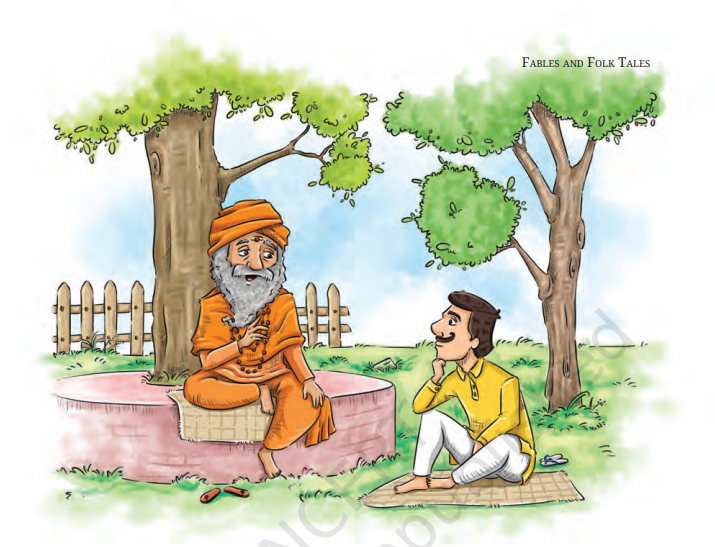
Poorvi | NCERT Solutions For Class 6 English | A Bottle of Dew Question Answer Solved | Chapter 1 | Unit 1 | Ultimate Guide 2025, is essential for young learners to build a strong foundation in the subject, and A Bottle of Dew Question Answer NCERT Question Papers for Class 6 English. Understanding the chapter thoroughly helps students grasp key concepts, improve comprehension, and perform well in exams.
In this piece of article, Poorvi | NCERT Solutions For Class 6 English | A Bottle of Dew Question Answer Solved | Chapter 1 | Unit 1 | Ultimate Guide 2025, we provide detailed A Bottle of Dew Question Answer to make learning easier and more effective. Whether you are a student looking for well-explained solutions or a parent guiding your child, this guide will be a helpful resource for mastering the chapter with confidence. Also, we include A Bottle of Dew Summary and NCERT Class 6 English Book PDF with solutions.
Table of Contents
NCERT A Bottle of Dew Question Answer Solved | Class 6 | Must Read
Let us do these activities before we read:(A Bottle of Dew Question Answer)
I. Circle the picture that matches with each word. Check your answers by sharing them with your classmates and teacher.
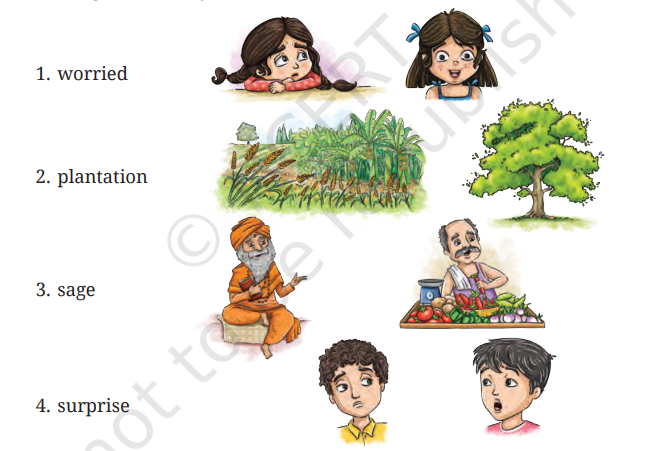
Answer:
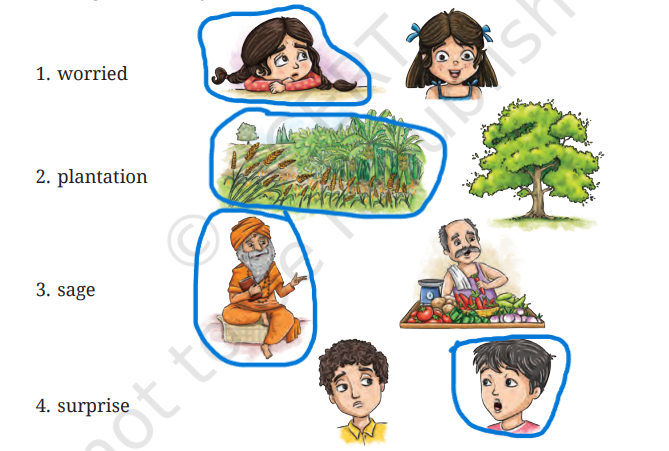
II. Answer these questions and discuss them with your classmates and teacher.
1. Think of a time when you worked hard. What did you do then?
2. How did it help you?
3. How did it make you feel?
Answer: Dear students, please do it by yourselves.
A Bottle of Dew Summary in English: (A Bottle of Dew Question Answer)
Rama Natha, the son of a wealthy landlord, inherited large lands but wasted his life searching for a magical potion that could turn objects into gold. Many people fooled him, but he didn’t give up. His worried wife, Madhumati, feared they would become poor. One day, a sage named Mahipati told Rama Natha that he could make the potion by planting banana trees, caring for them, and collecting five litres of morning dew over the years.
Rama Natha followed the sage’s instructions, worked hard on his land, and built a successful banana plantation with his wife’s help. After six years, he brought the dew to the sage, who chanted over it and returned it as the “potion.” But it did not work on a copper vessel. Rama Natha accused the sage of cheating, but Madhumati then showed a box full of gold coins. The sage explained that their wealth came from their own hard work, not magic. Rama Natha realized the truth and continued working diligently on his farm.
A Bottle of Dew Summary in Hindi: (A Bottle of Dew Question Answer)
रामनाथ एक अमीर जमींदार का बेटा था। उसके पिता की मृत्यु के बाद उसे बहुत सारी ज़मीन मिली, लेकिन वह एक जादुई अमृत की खोज में लग गया जो किसी भी वस्तु को सोने में बदल सकता था। कई लोग उसे धोखा देते रहे, लेकिन वह नहीं रुका। उसकी पत्नी मधुमती बहुत चिंतित थी क्योंकि वह देख रही थी कि रामनाथ सारा धन बर्बाद कर रहा है।
एक दिन महिपति नामक एक साधु उनके शहर आए। उन्होंने रामनाथ को बताया कि एक विशेष अमृत बनाया जा सकता है अगर वह खुद केले के पौधे लगाए और सुबह की ओस इकट्ठा करे। छह वर्षों तक रामनाथ ने मेहनत से काम किया और एक बड़ा केला बागान तैयार किया। उसकी पत्नी ने फल बेचकर पैसे जमा किए।
अंत में जब वह ओस लेकर साधु के पास गया, और “जादुई मंत्र” के बाद जब उसने उसे इस्तेमाल किया, तब कुछ भी नहीं बदला। रामनाथ को धोखा लगा। लेकिन मधुमती ने तब एक सोने के सिक्कों से भरा बक्सा दिखाया। साधु ने समझाया कि असली अमृत मेहनत है। रामनाथ ने यह सच्चाई समझी और फिर और भी मेहनत से काम करने लगा।
Let us discuss: (A Bottle of Dew Question Answer)
1. What did Rama Natha believe?
Answer: Rama Natha believed that there was a magic potion that could turn any object into gold.
2. How did the sage help Rama Natha?
Answer: The sage helped Rama Natha by making him work on his land. This way, Rama Natha became rich through hard work.
3. Do you think Rama Natha will be able to collect the dew? Give a reason.
Answer: Yes, Rama Natha will be able to collect the dew because he worked hard and took care of the banana plants every day.
4. Why was Rama Natha angry?
Answer: Rama Natha was angry because the magic potion did not turn the copper vessel into gold. He thought the sage had cheated him.
5. How did Rama Natha and Madhumati create wealth?
Answer: Rama Natha and Madhumati created wealth by growing banana plants and selling the bananas in the market. They earned money through hard work.
NCERT Unit Wise / Chapter Wise Solutions | Poorvi | Class 6 English
| Unit | Chapter | Topic | Link |
|---|---|---|---|
| Chapter 1 | A Bottle of Dew | Start Reading | |
| Unit 1 | Chapter 2 | The Raven And The Fox | Start Reading |
| Chapter 3 | Rama to The Rescue | Start Reading | |
| Chapter 1 | The Unlikely Best Friends | Start Reading | |
| Unit 2 | Chapter 2 | Comming Soon | Comming Soon |
| Chapter 3 | Comming Soon | Comming Soon |
Let us think and reflect: (A Bottle of Dew Question Answer)
I. Read the following lines and answer the questions that follow.
1. He spent all his time to learn about the magic potion. People cheated him often, promising to tell him about it, but he did not give up. His wife, Madhumati, was tired of this and also worried because she saw
how much money Rama Natha was spending. She was sure that soon they would be without money.
(i) Complete the sentence with a suitable reason.
Rama Natha did not ‘give up’ because he was determined to learn about the magic potion.
(ii) Read the column which shows ‘what happened’ and write the correct outcome in the next column.

Answer:
| What Happened | Outcome |
|---|---|
| A. People promised to tell Rama Natha about the magic potion. | He was often cheated but still continued his search. |
| B. Rama Natha was spending a lot of money. | His wife, Madhumati, became tired and worried they would become poor. |
(iii) Write whether the following statements are True or False.
- A. Madhumati was troubled about what her husband did. [ True✅ ]
- B. Rama Natha was very happy digging his fields. [ False❌ ]
- C. The sage wanted to show the right path to Rama Natha. [ True✅ ]
2. Carefully, he took the bottle to the sage. The sage smiled and muttered something over the water. Then he returned the bottle and said, “Try it out.” Rama Natha sprinkled a few drops on a copper vessel and waited for it to turn to gold. To his surprise nothing happened!
(i) Choose the option that lists the events given below in the correct order.
- A. The sage smiled.
- B. Rama Natha gave the bottle to the sage.
- C. Rama Natha dropped a few drops of water on a copper vessel.
- D. He said something in a low voice over the water.
- E. Rama Natha waited to see if the magic worked.
Answer: B → A → D → C → E
(ii) Fill in the blank with the correct word from the lines given above.
Seeing that the plant had dried up, the gardener sprinkled some water on it.
(iii) How might Rama Natha have felt when nothing happened to the copper vessel?
Answer: Rama Natha might have felt surprised, disappointed, and confused when nothing happened to the copper vessel.
II. Answer the following questions. (A Bottle of Dew Question Answer)
1. What did the sage ask Rama Natha to do to make the magic potion?
Answer: The sage asked Rama Natha to plant banana plants, take care of them, and collect morning dew from their leaves until he had five litres.
2. Why did the sage ask Rama Natha to do everything himself?
Answer: The sage asked Rama Natha to do everything himself so that he would learn the value of hard work and earn wealth on his own.
3. How could Rama Natha have a big banana plantation after six years?
Answer: Rama Natha had a big banana plantation after six years because he worked hard, planted many banana trees, and took good care of them every day.
4. How did the sage make Rama Natha believe that there is no magic potion?
Answer: The sage made Rama Natha believe there is no magic potion by showing him that his wealth came from his own hard work, not magic. He told Rama Natha the truth after six years and showed the gold coins earned by selling bananas.
5. Fill in the ‘before’ and ‘after’ table about Rama Natha.

Answer:
| What he did before meeting the sage | What he did after meeting the sage |
|---|---|
| (i) Searched for a magic potion | (i) Planted and cared for banana trees |
| (ii) Wasted money and ignored his land | (ii) Collected dew and worked hard on his farm |
Let us learn: (A Bottle of Dew Question Answer)
1. Read the following words from the story.
promised remember spending cheated luck huge difficult market
Use the words correctly to complete the paragraph given below. There are two extra words in the box that you do not need.
There was a farmer who had a ____ coconut plantation. He worked hard and did not depend on ____. Every day was ___ but he did not give up. One day, a man bought a bag of coconuts from him and _____ to pay him the money the next day. Days passed, and the man did not pay him anything. The farmer felt ______. About two months later, he met the same man and asked him about his money. The man said, “Oh! I had forgotten. Now, I __ buying coconuts from you.” And he paid the money.
Answer: There was a farmer who had a huge coconut plantation. He worked hard and did not depend on luck. Every day was difficult but he did not give up. One day, a man bought a bag of coconuts from him and promised to pay him the money the next day. Days passed, and the man did not pay him anything. The farmer felt cheated. About two months later, he met the same man and asked him about his money. The man said, “Oh! I had forgotten. Now, I remember buying coconuts from you.” And he paid the money.
2. Read the words from the story in Column A. Read the new words in Column B. Complete the meanings of the words given in Column B. Meanings of some words are given below.
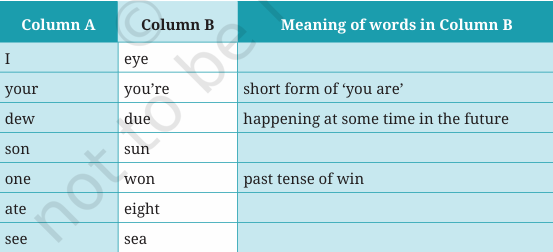
The words given in each row of the table above have the same sounds but different spellings and meanings. Such words are called homophones.
Answer:
| Column A | Column B | Meaning of words in Column B |
|---|---|---|
| I | eye | part of the body used for seeing |
| your | you’re | short form of ‘you are’ |
| dew | due | happening at some time in the future |
| son | sun | the star that gives us light and heat |
| one | won | past tense of win |
| ate | eight | the number that comes after seven |
| see | sea | large body of salt water |
3. Choose four pairs of homophones from the table above, and for each pair write a sentence that uses both homophones in the same sentence. Check your answers by sharing them with your teacher and classmates. An example has been given below:
Answer:
- I ate eight bananas for breakfast today. (ate/eight)
- I hurt my eye while playing football. (I/eye)
- Your bag is on the table, and you’re going to need it for school. (your/you’re)
- I can see the sea from my window. (see/sea)
- The sun was shining brightly as the mother walked with her son in the park. (son/sun)
4. Match the phrases in Column A with the phrases in Column B. Use the connecting words given in the middle column to make meaningful sentences.

Now, write the new sentences in your notebook.
Answer:
- The children submitted their work before the deadline.
- He did not want to try rock climbing because of his fear of heights.
- The children ran towards the gate as soon as the bell rang.
- Nitin was late to school today as there was a traffic jam.
5. Here are two sentences with letter ‘b’. Read them slowly the first time. As you read them a few more times, read them faster each time.

Now, try to create a tongue twister on your own and share it with your peers.
Answer: “Tiny Tanu tossed ten tomatoes to twenty tall teachers on Tuesday.” Try reading it slowly at first, then faster each time.
Let us listen: (A Bottle of Dew Question Answer)
You will listen to what Madhumati does with the bananas from her plantation. As you listen, number the events in the correct order in which they happen. Write the number in the box beside each event.
- Gives two bananas to a boy who is hungry [ 6 ]
- Meets her friend Kalawati in the market [ 3 ]
- Visits her mother and gives her two dozen bananas [ 1 ]
- Chooses to go home as only some bananas were left [ 5 ]
- Visits her neighbour and gifts them a bunch of bananas [ 7 ]
- Gives twelve bananas to her friend [ 4 ]
- Goes to the market to sell the bananas [ 2 ]
Let us speak: (A Bottle of Dew Question Answer)
I. Read aloud the following words from the story.(A Bottle of Dew Question Answer)
Answer: Dear students, this is only speaking test question. I beleive that you can do it by yourselves. Try to do it and comment me in comment section.
II. Discuss the following questions with a partner. You may use the hints given in brackets while speaking.
1. What does hard work mean to you?(It means … / It is something … / Well, you see … /What I mean is …)
Answer: Well, you see, hard work means trying your best in everything you do. It is something that helps you learn and improve. What I mean is, even if something is difficult, you don’t give up. It means doing your work carefully and not being lazy. It helps us become better and reach our goals.
2. Give three reasons why you think hard work is important. (Firstly, I feel … because … / Secondly, I think … since … /Lastly, I believe … as … )
Answer: Firstly, I feel hard work is important because it helps us achieve our goals. Secondly, I think it is good since it teaches us to be responsible. Lastly, I believe hard work is needed as it makes us confident and strong.
3. Share three ideas you would give to someone who needs to work hard. (To begin with, it is important that … /Next, you could … / Finally, I think you should … )
Answer: To begin with, it is important that you stay focused and don’t give up easily. Next, you could make a plan and follow it step by step. Finally, I think you should believe in yourself and keep trying, even if it’s hard.
Let us write: (A Bottle of Dew Question Answer)
1. Work in pairs to complete the description of a banana. You may take the help of the words given in brackets. Share your answers with your classmates and teacher.
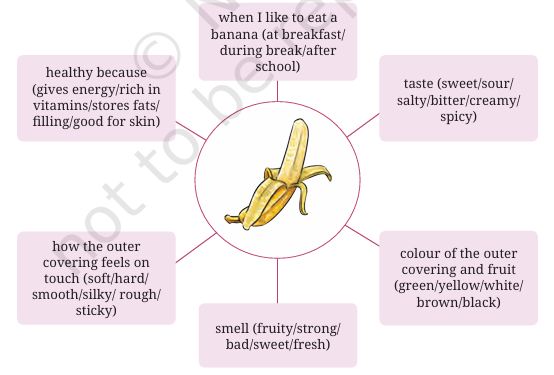
Now, use the information given in the picture to write eight sentences about a banana. Share your responses with your classmates and teacher.
Answer: Here are eight sentences about a banana using the information from the picture:
- I like to eat a banana at breakfast because it gives me energy.
- A banana is healthy because it is rich in vitamins and good for the skin.
- It tastes sweet and creamy when it is ripe.
- The outer covering of a banana is usually yellow, and the fruit inside is white.
- A ripe banana smells fruity and fresh.
- The banana peel feels smooth and a little soft when you touch it.
- I sometimes eat a banana after school when I feel hungry.
- Bananas are also very filling and keep me full for a long time.
- Let me know if you’d like this turned into a short paragraph too.
Let us explore: (A Bottle of Dew Question Answer)
Find out the varieties of bananas which are grown, cultivated and eaten in different parts of India.
Answer: There are different types of varieties of bananas grown all over India. Here are some types I am providing,
- Robusta -> Tamil Nadu, Kerala, Karnataka, Andhra Pradesh
- Dwarf Cavendish -> Tamil Nadu, Maharashtra, Gujarat
- Nendran (Plantain) -> Kerala
- Red Banana (Lal Kela) -> Tamil Nadu, Kerala, Karnataka, Andhra Pradesh
- Malbhog -> Assam, Bihar, West Bengal
- Amritsagar -> West Bengal
NCERT Unit Wise / Chapter Wise Solutions | Poorvi | Class 6 English
| Unit | Chapter | Topic | Link |
|---|---|---|---|
| Chapter 1 | A Bottle of Dew | Start Reading | |
| Unit 1 | Chapter 2 | The Raven And The Fox | Start Reading |
| Chapter 3 | Rama to The Rescue | Start Reading | |
| Chapter 1 | The Unlikely Best Friends | Start Reading | |
| Unit 2 | Chapter 2 | Comming Soon | Comming Soon |
| Chapter 3 | Comming Soon | Comming Soon |

5 thoughts on “Poorvi | A Bottle of Dew Question Answer Solved | Chapter 1 | Unit 1 | Ultimate Guide 2025”